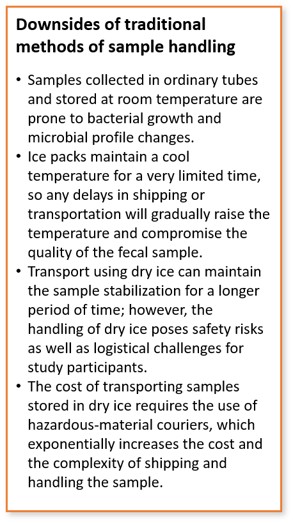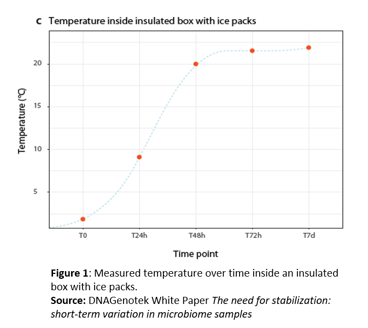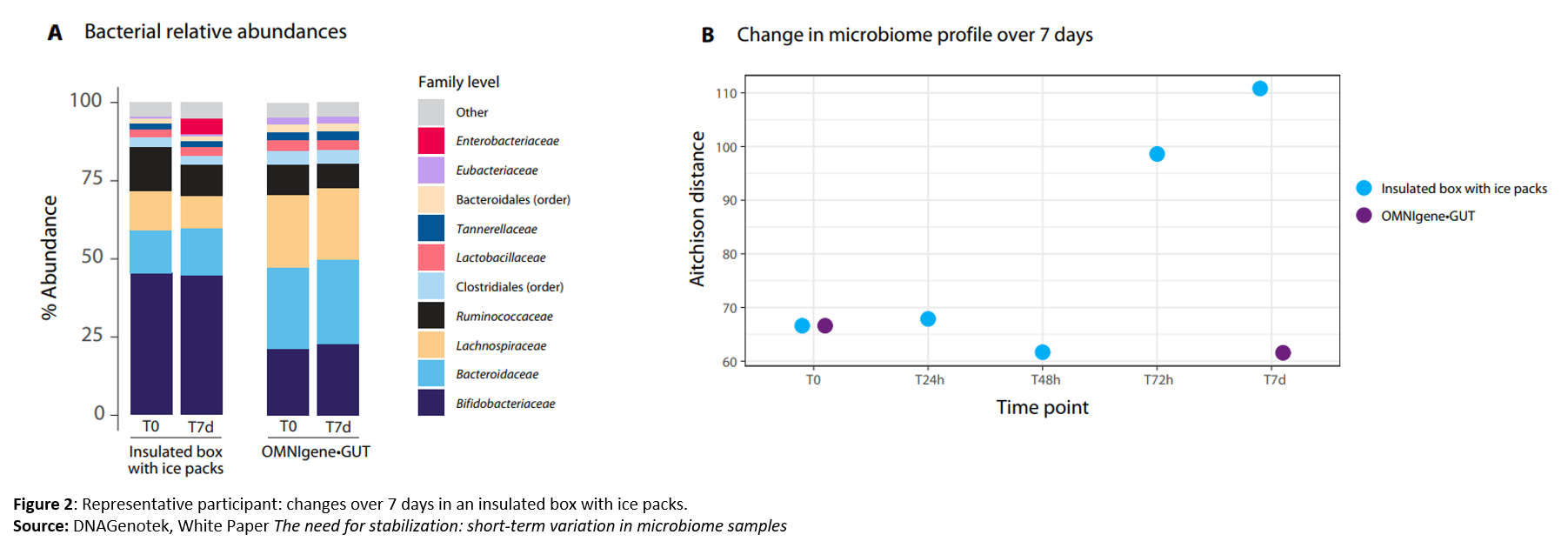2021-11-10
 Accurate recovery of the microbial profile is essential to linking gut microbiome to host health. To appropriately analyze the recovered sample, a comprehensive snapshot of the microbial community contained in fecal sample collection, is required.
Accurate recovery of the microbial profile is essential to linking gut microbiome to host health. To appropriately analyze the recovered sample, a comprehensive snapshot of the microbial community contained in fecal sample collection, is required.
In the past, a number of sample-handling methods were used, including ice packs, dry ice, and ambient-temperature storage, all of which have significant drawbacks (Textbox).
 DNAGenotek products undergo regular rigorous assessments to validate product claims and to ensure that they continue to provide the high-quality samples that are required for clinical and research studies.
DNAGenotek products undergo regular rigorous assessments to validate product claims and to ensure that they continue to provide the high-quality samples that are required for clinical and research studies.
OMNIgene•GUT was recently subjected to such a study. The all-in-one system allows easy at-home collection of fecal samples even by untrained participants; and contains a built-in homogenization system and stabilization agent to preserve microbial DNA found in the fecal sample and required for downstream stool microbiome analysis.
The purpose of the study was to demonstrate the importance of sample stabilization by showing the swift progressive change of the sample microbiome profile shortly after collection. 19 fecal samples were collected and then exposed to simulated but common transport conditions, including:
-
Ambient temperature (20°C - 23°C),
-
In a -80°C freezer,
-
In an insulated box with two frozen ice packs, and
-
In an OMNIgene•GUT device stored at room temperature.
While no significant changes were observed in the samples stored in the -80°C freezer or in OMNIgene•GUT devices, there were noticeable changes in the fecal sample’s microbiome composition, as early as 24 hours after collection in the samples stored at room temperature; and at 48 hours for those stored in an insulated box. Therefore, compared to OMNIgene•GUT devices, room-temperature storage and the insulated box only marginally mitigate the effects of sample destabilization.
At 7 days, further significant changes were observed in the relative abundance of particular types of bacteria:
-
Two-fold increase in the amount of Lactobacillaceae in the sample stored at room temperature and a nine-fold increase for the sample stored in the insulated box, compared to baseline microbiome profile.
-
Increase in the relative abundance of Enterobacteriaceae in the sample stored in the insulated box.
In contrast, none of these changes occurred in the samples stored at -80°C or in OMNIgene•GUT devices. When compared to the baseline microbiome profile after 7 days, both the sample composition and the taxonomic relative abundances were preserved.
In contrast, none of these changes occurred in the samples stored at -80°C or in OMNIgene•GUT devices. When compared to the baseline microbiome profile after 7 days, both the sample composition and the taxonomic relative abundances were preserved.
Key Takeaways
All sample preservation and stabilization methods are not created equal, especially if an accurate snapshot of the gut microbiome is required for subsequent analyses and applications:
-
OMNIgene•GUT removes logistical challenges associated with traditional cold-chain methods of transport and preservation. It also improves user experience and increases compliance with collection instructions.
-
Designed to collect a volumetric sample that is properly homogenized and stabilized at the time of collection, OMNIgene•GUT samples result in consistent, reliable, and reproducible microbiome profiles, required for medical-grade research and clinical studies.
-
Samples stored at -80°C and in OMNIgene•GUT devices do not significantly change, 7 days after sample storage; however,
-
When choosing between storage at -80°C, storage at room temperature, or using OMNIgene•GUT, it is evident that the cheaper and easier method is the better option.
-
When held unstabilized, changes in fecal microbiome samples occur rapidly and progressively, producing adverse results on post sample-collection applications. This also limits the detection of biological effects in the microbiome. In comparison, samples stored in OMNIgene•GUT devices, at room temperature, were stable within a 7-day period after collection.
-
When considering shipping with dry ice, a hazardous material that needs to be handled by hazardous-material couriers, it is obvious that OMNIgene•GUT devices, which eliminate the need for cold-temperature logistics, are the better option.
-
When expecting delays beyond 24 hours, stabilization becomes essential to processing fecal samples. OMNIgene•GUT devices provide peace of mind, ensuring the collected samples are stable within a 7-day period at room temperature. [1]
-
This post is based on DNAGenotek’s white paper titled The need for stabilization: short-term variation in microbiome samples.

Reference
[1] PD-WP-00042: OMNIgene®•GUT stabilizes the microbiome profile at ambient temperature for 60 days and during transport (pdf)



